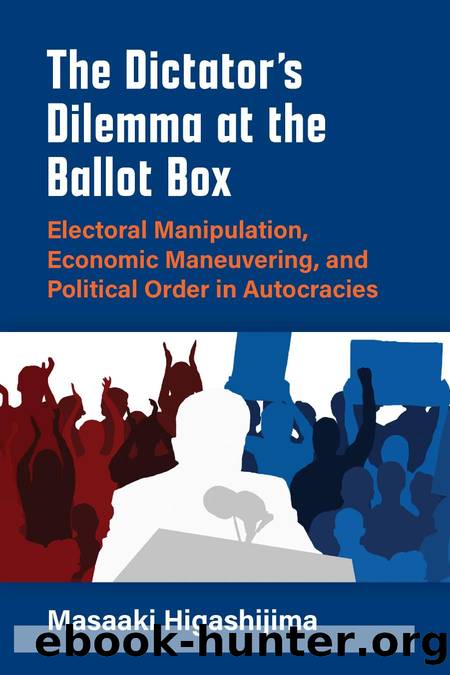The Dictator's Dilemma at the Ballot Box: Electoral Manipulation, Economic Maneuvering, and Political Order in Autocracies by Masaaki Higashijima

Author:Masaaki Higashijima [Higashijima, Masaaki]
Language: eng
Format: mobi, pdf, azw3, epub
Tags: Political Ideologies, Campaigns & Elections, Democracy, Political Process, Asia, General, Asian, Political Science, Central Asia, World, History
ISBN: 9780472075317
Publisher: University of Michigan Press
Published: 2022-06-07T00:00:00+00:00
Backfiring at the Ballot Box
165
When an autocrat wins an election by a crushing margin, the total number of votes that he obtains consists of âhonestâ and âdishonestâ parts. The
âhonestâ part is the total number of real votes from his supporters. These citizens vote for the dictator after positively evaluating his economic and policy performance. Specifically, authoritarian leadersâ popular support depends on the breadth of economic distribution to the citizenry. Gaining voluntary support is costly because governments must invest large amounts of financial resources to satisfy their citizens. Hence, although manipulation of policy instruments is also another form of electoral strategy for autocrats, costly mobilization of citizensâ support through the distribution of pork and patronage contributes to making election results âhonestââ in the sense that citizens vote for autocracy in return for receiving patronage and club goods.
The âdishonestâ element is the total number of votes resulting from electoral manipulationâ blatant electoral fraud and institutional manipulation. As already detailed in chapter 3, blatant electoral fraud deviates election results from votersâ initial vote preferences, in favor of the political leader. As analyzed in chapter 4, SMD systems generate a significant seat premium to ruling parties. Both blatant electoral fraud and electoral system manipulation, though different, contribute to an electoral victory with a margin that could not be achieved without such manipulations. In the sense that these techniques of electoral manipulation distort election outcomes away from citizensâ actual support level for the dictator, they make election results less credible.
Making sense of his mobilization capabilities, if the autocrat matches the extent of electoral manipulation with them, he can exploit as much electoral benefit as possible while maintaining an overwhelming majority. When this is the case, elections are likely to contribute to authoritarian stability. In fact, as chapters 3 and 4 have empirically demonstrated, authoritarian regimes with substantial discretionary resources, strong disciplinary organizations, and a weak opposition tend to have lower levels of blatant electoral fraud and to adopt more proportional electoral systems.
These results imply that authoritarian leaders strategically manipulate elections based on their ability to cultivate popular support through the effective distribution of patronage and pork: dictators with high mobilization capabilities strategically open the electoral field, while those with low mobilization capabilities manipulate elections by coercive and institutional measures. Contrary to this, however, when the autocrat fails to adequately deal with the electoral dilemma depending upon his mobilization capabilities, the elections are more likely to backfire on him. More specifically,
166
The Dictatorâs Dilemma at the Ballot Box
autocrats fail to deal with the electoral dilemma in two ways: undersupply and oversupply of electoral manipulation.
âUndersupplyâ of Electoral Manipulation and Leadership Crisis Stability may not be achieved when authoritarian leaders are overconfident about their popularity and strengths, hold multiparty elections, and then lose a supermajority (or even an electoral victory to opposition parties).
The failure to win big reveals the dictatorâs weakness, activating within-regime threats and increasing the likelihood of coups. Even if ruling elites do not punish the low- performing incumbent, excessively free and fair elections may lead to stunning opposition victories.
Download
The Dictator's Dilemma at the Ballot Box: Electoral Manipulation, Economic Maneuvering, and Political Order in Autocracies by Masaaki Higashijima.pdf
The Dictator's Dilemma at the Ballot Box: Electoral Manipulation, Economic Maneuvering, and Political Order in Autocracies by Masaaki Higashijima.azw3
The Dictator's Dilemma at the Ballot Box: Electoral Manipulation, Economic Maneuvering, and Political Order in Autocracies by Masaaki Higashijima.epub
This site does not store any files on its server. We only index and link to content provided by other sites. Please contact the content providers to delete copyright contents if any and email us, we'll remove relevant links or contents immediately.
| Anarchism | Communism & Socialism |
| Conservatism & Liberalism | Democracy |
| Fascism | Libertarianism |
| Nationalism | Radicalism |
| Utopian |
The Secret History by Donna Tartt(16662)
The Social Justice Warrior Handbook by Lisa De Pasquale(11494)
Thirteen Reasons Why by Jay Asher(7803)
This Is How You Lose Her by Junot Diaz(5800)
Weapons of Math Destruction by Cathy O'Neil(5046)
Zero to One by Peter Thiel(4835)
The Myth of the Strong Leader by Archie Brown(4796)
Promise Me, Dad by Joe Biden(4459)
Beartown by Fredrik Backman(4434)
Stone's Rules by Roger Stone(4423)
How Democracies Die by Steven Levitsky & Daniel Ziblatt(4414)
The Fire Next Time by James Baldwin(4351)
100 Deadly Skills by Clint Emerson(4086)
A Higher Loyalty: Truth, Lies, and Leadership by James Comey(4041)
Rise and Kill First by Ronen Bergman(4021)
The David Icke Guide to the Global Conspiracy (and how to end it) by David Icke(3892)
The Farm by Tom Rob Smith(3878)
Secrecy World by Jake Bernstein(3789)
The Doomsday Machine by Daniel Ellsberg(3738)
